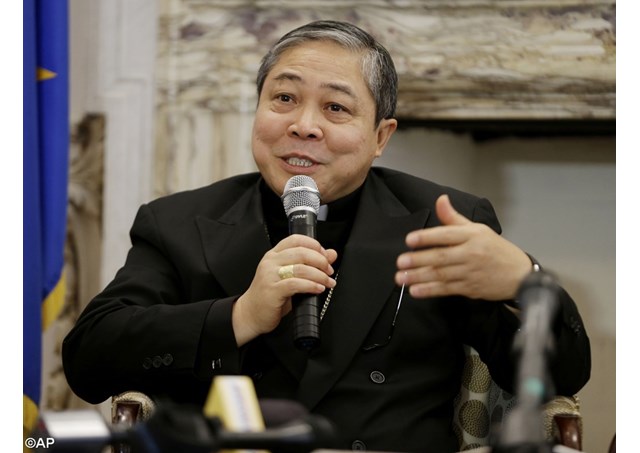
Abp Auza to UN: migration oughtn't be desperate nececessity

(Vatican Radio) The Apostolic Nuncio and Permanent Observer to the United Nations in New York, Archbishop Bernardito Auza, has released his prepared remarks to the first of two panel discussions of issues surrounding sustainable development and poverty eradication, in connection with the Global Compact on safe, orderly and regular migration. Please find the full text of Archbishop Auza's prepared remarks below
*********************************************************
Intervention of H.E. Archbishop Bernardito Auza
Apostolic Nuncio and Permanent Observer of the Holy See to the United Nations
Global Compact on safe, orderly and regular migration:
Informal Thematic Session on Addressing drivers of migration, including adverse effects of climate change, natural disasters and human made crisis, through protection and assistance, sustainable development, poverty eradication, conflict prevention and resolution
Panel 1: Sustainable Development and Poverty Eradication
New York, 22 May 2017
Distinguished Ambassadors and Panelists,
The number of migrants crossing international borders is at its highest total in recorded history. Even more dramatic, as laid out in the interagency brief produced for this thematic session, is the fact that the number of people displaced within their own countries far exceeds those moving across international borders.
While it is true that the current mixed flows of mass migrations often reveal serious failures and shortcomings on the part of States and the International Community, they also point to the aspiration of many to build a better life for themselves and their families. It is crucial that we view migration not as merely a negative phenomenon, but rather as a complex reality, one in which the needs and expectations of all those involved ought to lead to greater solidarity and to a coherent international framework for the global management of migration. A change of attitude towards migrants and refugees is needed, from defensiveness and fear, indifference and marginalization towards a culture of encounter and more creative forms of solidarity.
Certainly, responsibility and burden sharing need to take into account a country’s wealth and level of development. The persisting economic crisis limits the options of a single country’s response to the emergencies, as do the devastating droughts in some parts of the world that weaken the delivery of humanitarian assistance to the increasing number of refugees and forcibly displaced persons. In this context, "the active involvement of international partners is indispensable”[1].
Pope Francis, however, reminds us that “working together for a better world requires that countries help one another, in a spirit of willingness and trust, without raising insurmountable barriers.” Indeed, the best way forward is to start from this position of cooperation, and from there confront together the many global socioeconomic imbalances that we face and in which every country has a stake.
Recognizing this, the International Community committed itself to the implementation of the 2030 Agenda for Sustainable Development. At its core is the eradication of poverty, the provision of universal access to health care and to quality education, and decent work. The Global Compact for Migration is a unique opportunity to develop concrete, coordinated policies and investments in these specific areas. Many private and public initiatives, especially at the local level, are already engaged in this work. The Global Forum on Migration and Development, as well as the various consultations currently being organized by the International Organization for Migration, are opportunities to see how these initiatives can be scaled bilaterally, regionally and internationally through the Global Compact.
Finally, we must remember that before the right to emigrate, there is the right of all to remain in their countries in peace and economic security. Migration should not be a desperate necessity; it should be a choice. If the Global Compact adopts and implements this approach, migration will not only become voluntary but safer, more orderly and better governed by agreed regulations.
Thank you.
| All the contents on this site are copyrighted ©. |


